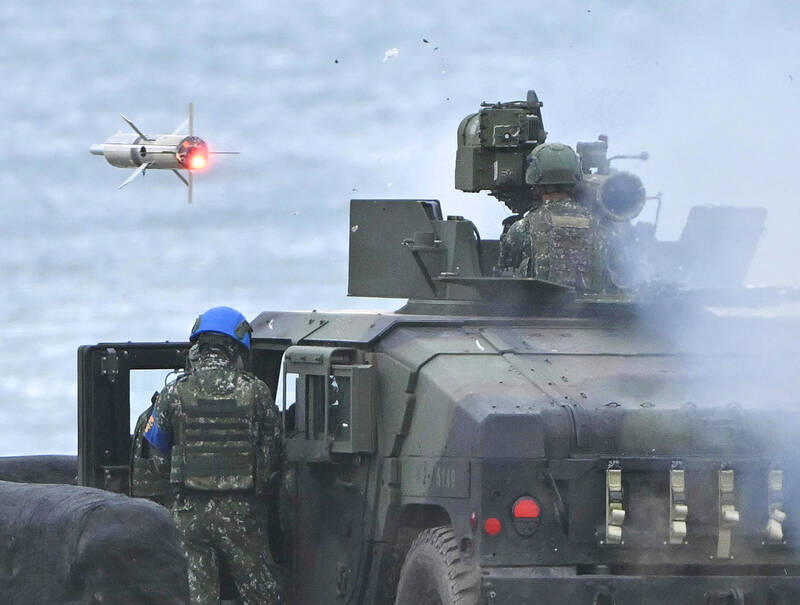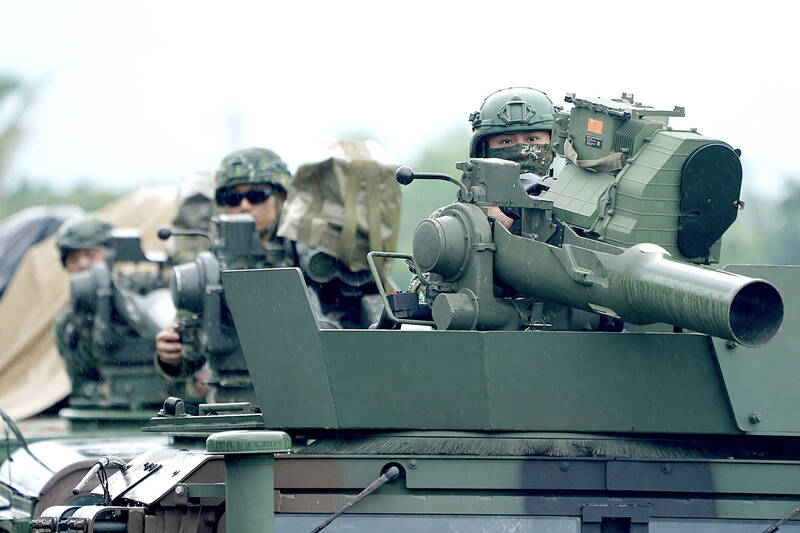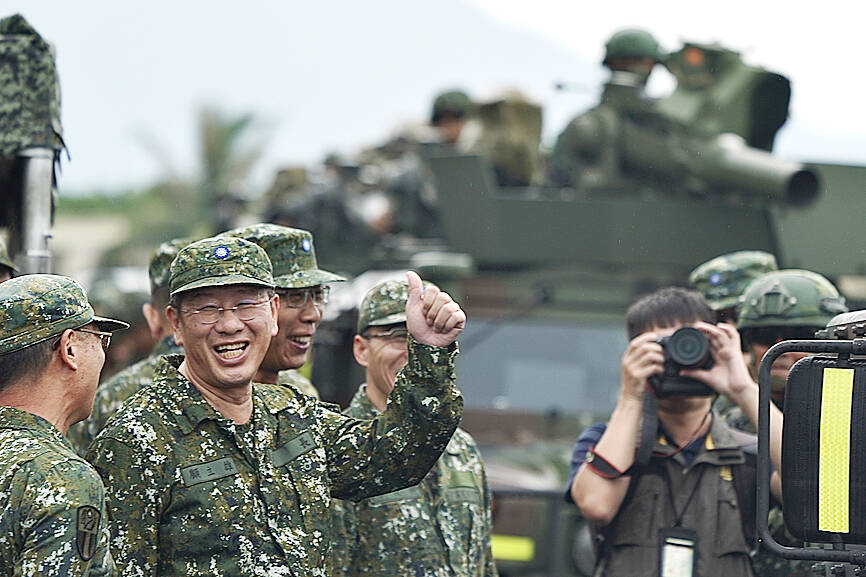The military yesterday drilled with anti-amphibious landing missiles as part of a strategy to remain mobile and deadly in an attempt to deter an attack from China.
Troops fired tube-launched, optically tracked, wire-guided TOW 2A missiles mounted on M1167 Humvees at floating targets off a beach in Pingtung County during two days of exercises.
Taiwan’s southern tip faces both toward the Taiwan Strait and China, and toward the Pacific Ocean.

Photo: Tu Chien-jung, Taipei Times
The missiles are among the most effective and popular anti-tank weapons in the world and a key component in what some experts say is the nation’s best strategy to resist a potential Chinese invasion.
China has ramped up its military threat based on its vast edge in numbers of planes, ships and missiles.
Taiwan has bought 1,700 units of the newer TOW 2B system from the US, the last of which are due to be delivered by the end of the year.

Photo: CNA
The two days of testing would also gauge the more sophisticated TOW 2B’s interoperability with the TOW 2A and its ability to acquire targets at night, the Ministry of National Defense said.
Advocates of such weaponry argue that the more mobile systems stand the best chance in an asymmetric battle against a much larger Chinese force.
China has the world’s largest standing military, but most of Taiwan is composed of steep mountains, mud flats and heavily builtup urban areas poorly suited to such a conventional force. Others have argued Taiwan needs more warplanes and surface ships.

Photo: CNA
China sends warplanes and warships near Taiwan on a near-daily basis in an attempt to intimidate the public and degrade defenses.
In response, Taiwan has extended the period of national military service to one year, is building its own submarines and importing sophisticated new equipment from the US.

EUROPEAN TARGETS: The planned Munich center would support TSMC’s European customers to design high-performance, energy-efficient chips, an executive said Taiwan Semiconductor Manufacturing Co (TSMC, 台積電), the world’s largest contract chipmaker, yesterday said that it plans to launch a new research-and-development (R&D) center in Munich, Germany, next quarter to assist customers with chip design. TSMC Europe president Paul de Bot made the announcement during a technology symposium in Amsterdam on Tuesday, the chipmaker said. The new Munich center would be the firm’s first chip designing center in Europe, it said. The chipmaker has set up a major R&D center at its base of operations in Hsinchu and plans to create a new one in the US to provide services for major US customers,

BEIJING’S ‘PAWN’: ‘We, as Chinese, should never forget our roots, history, culture,’ Want Want Holdings general manager Tsai Wang-ting said at a summit in China The Mainland Affairs Council (MAC) yesterday condemned Want Want China Times Media Group (旺旺中時媒體集團) for making comments at the Cross-Strait Chinese Culture Summit that it said have damaged Taiwan’s sovereignty, adding that it would investigate if the group had colluded with China in the matter and contravened cross-strait regulations. The council issued a statement after Want Want Holdings (旺旺集團有限公司) general manager Tsai Wang-ting (蔡旺庭), the third son of the group’s founder, Tsai Eng-meng (蔡衍明), said at the summit last week that the group originated in “Chinese Taiwan,” and has developed and prospered in “the motherland.” “We, as Chinese, should never

‘A SURVIVAL QUESTION’: US officials have been urging the opposition KMT and TPP not to block defense spending, especially the special defense budget, an official said The US plans to ramp up weapons sales to Taiwan to a level exceeding US President Donald Trump’s first term as part of an effort to deter China as it intensifies military pressure on the nation, two US officials said on condition of anonymity. If US arms sales do accelerate, it could ease worries about the extent of Trump’s commitment to Taiwan. It would also add new friction to the tense US-China relationship. The officials said they expect US approvals for weapons sales to Taiwan over the next four years to surpass those in Trump’s first term, with one of them saying

‘ABUSE OF POWER’: Lee Chun-yi allegedly used a Control Yuan vehicle to transport his dog to a pet grooming salon and take his wife to restaurants, media reports said Control Yuan Secretary-General Lee Chun-yi (李俊俋) resigned on Sunday night, admitting that he had misused a government vehicle, as reported by the media. Control Yuan Vice President Lee Hung-chun (李鴻鈞) yesterday apologized to the public over the issue. The watchdog body would follow up on similar accusations made by the Chinese Nationalist Party (KMT) and would investigate the alleged misuse of government vehicles by three other Control Yuan members: Su Li-chiung (蘇麗瓊), Lin Yu-jung (林郁容) and Wang Jung-chang (王榮璋), Lee Hung-chun said. Lee Chun-yi in a statement apologized for using a Control Yuan vehicle to transport his dog to a